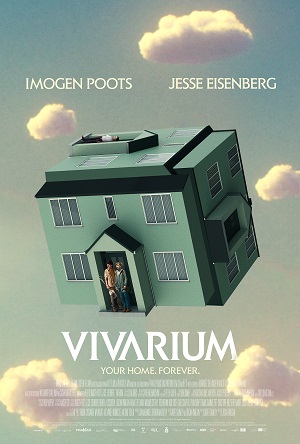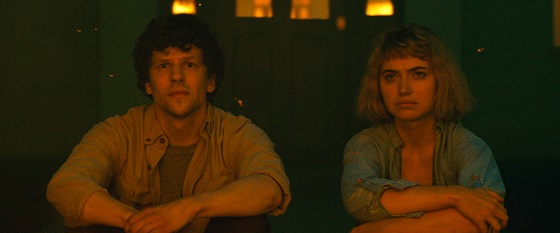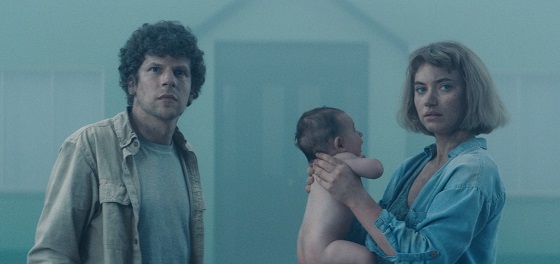

[Rating: Solid Rock Fist Up]
Domesticity, gender roles, urbanization, and a prescient journey into the horrors of isolation all stew together in the thematic broth where Vivarium simmers at a low boil. A sci-fi suspense thriller that’s as interesting as it is ambitious, the film transcends its Twilight Zone set-up to probe the evolving nature of the human condition, and what it means to have a “home.” Granted, the narrative is a bit bottom-heavy, but this also allows it to tip and sway without ever toppling over, giving Vivarium the freedom to keep shifting just enough so its audience is delightfully off-balance right up to the final shot.
When the movie introduces its two leads, it is on the grounds of an elementary school as the students are leaving for the day and teacher Gemma (Imogen Poots) is meeting up with her groundskeeper boyfriend, Tom (Jesse Eisenberg). The pair are looking for a new place together, and head to a housing development rental office where they meet a stilted, almost robotic sales associate named Martin (Jonathan Aris). Martin convinces the pair to follow him to a new suburban tract just outside of town, which upon arrival they realize is little more than an impersonal, cookie-cutter neighborhood that’s just as sterile and off-putting as Martin.
Things take a spooky turn when Martin disappears halfway through the tour of a unit, leading Tom and Gemma to try and leave the neighborhood, only to find that it is something of a circular labyrinth from which there is no escape. Efforts to drive or walk in a straight line only lead them back to their starting point, the house where Martin brought them, which is regularly supplied by delivery people unseen with boxes of flavorless food. All efforts to discover where these mystery parcels come from are fruitless, which becomes even more disconcerting for Gemma and Tom when a box appears one day with a living baby inside and a note that reads, “Raise the child and be released.”

As Vivarium proceeds, Gemma and Tom grow increasingly cagey as they’re forced into a domestic cycle with the child creature whose only connection to them or humanity is its appearance. Unable to escape and with no communication from their captor(s) about where they are or what the purpose of this waking hell might be, Gemma and Tom trudge forward. The ways that Gemma and Tom react and respond to the situation within the deliberately domestic sphere draws out not just the best and worst of their personalities, but the ingrained social constructs of western gender roles. While Gemma is more flexible in her household duties, Tom adheres to a more traditional framework that sees him doing physical work while Gemma is tasked with tending to the “child,” a narrative development that seems anything but coincidental, here.
This is the sophomore feature effort by writer/director Lorcan Finnegan, who is employing a clever set-up not just for the sake of telling a fun story (which this is), but to speak to the ways that consumerism ultimately consumes the consumer. The tract housing, box deliveries, and regimented domestic routines all comment on the larger prison-like universe of adult responsibilities that are tied up in the American Dream of suburban living. And while home ownership for some is the culmination of a lot of hard work towards an equity investment, for others it is just a means to reach a predetermined level of success where the domicile becomes little more than a financial albatross.
It’s a fun little mix of creative storytelling with poignant messaging, boosted by a release right in the middle of a global pandemic that will likely find audiences in a similar state of mind as Gemma and Tom (stuck at home with no escape). Imagery in the opening credits showing a cuckoo chick engaging in brood parasitism behavior gives the audience an idea of what kind of story this will be, and without getting into spoiler territory, it is indeed an apt introduction. The larger story’s “how” and “why” aren’t explored all that much, yet the narrative never presents these ideas as anything more than a vague question mark in the background. This is a film about Gemma and Tom, after all, not the captors tormenting them.

While Eisenberg mostly pouts and claws at the restraints of his innate domestic imperatives, Poots finds a track within the screenplay where she can vacillate believably between vanquished and defiant. She’s at her best when she’s on the verge of defeat, playing Gemma as a conquered yet insolent captive who never gives up on the central mystery of her internment. Finnegan gets superb performances out of both leads and is smart enough to pull back on the manic desperation that would have likely been an easy fallback point throughout the second and third acts. Restrained CG effects that paint this housing tract as just slightly off are sufficient for the script’s needs, and the set design is positively terrifying in its knowing simplicity (the picture of the bedroom above the bed, or of the house just inside the living room, are great touches).
Opening today, Vivarium is a clever, unsettling, and freakishly timely exploration on the prison of domesticity. Bolstered by a career-best performance from Imogen Poots, the movie struggles a bit with its ending, yet establishes enough of a foundation for itself that it can survive a little bit of a wobble in the closing minutes. The perfect salve to anyone feeling a little stir crazy, Vivarium asks a couple interesting questions within the framework of a fun mystery, yet unlike the world’s current predicament, ends in a tidy 97 minutes.





Comments on this entry are closed.